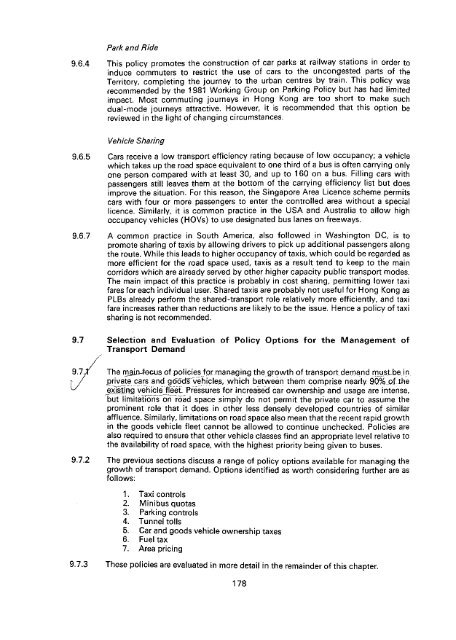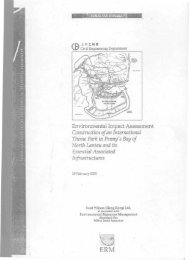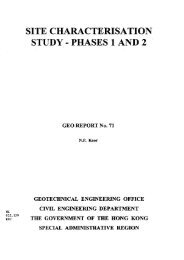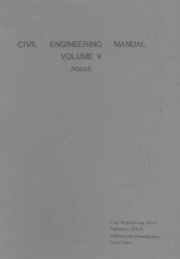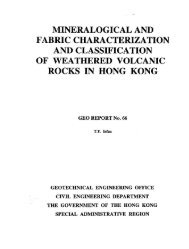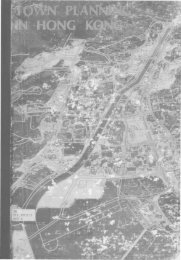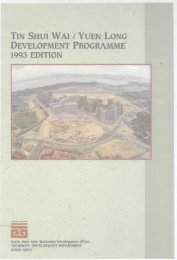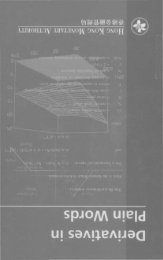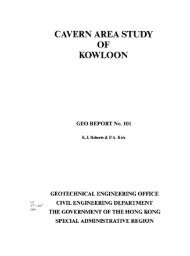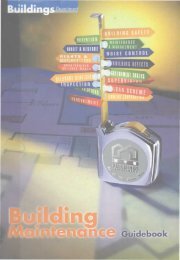Untitled - HKU Libraries - The University of Hong Kong
Untitled - HKU Libraries - The University of Hong Kong
Untitled - HKU Libraries - The University of Hong Kong
- No tags were found...
You also want an ePaper? Increase the reach of your titles
YUMPU automatically turns print PDFs into web optimized ePapers that Google loves.
Park and Hide9.6.4 This policy promotes the construction <strong>of</strong> car parks at railway stations in order toinduce commuters to restrict the use <strong>of</strong> cars to the uncongested parts <strong>of</strong> theTerritory, completing the journey to the urban centres by train. This policy wasrecommended by the 1981 Working Group on Parking Policy but has had limitedimpact. Most commuting journeys in <strong>Hong</strong> <strong>Kong</strong> are too short to make suchdual-mode journeys attractive. However, it is recommended that this option bereviewed in the light <strong>of</strong> changing circumstances.Vehicle Sharing9.6.5 Cars receive a low transport efficiency rating because <strong>of</strong> low occupancy; a vehiclewhich takes up the road space equivalent to one third <strong>of</strong> a bus is <strong>of</strong>ten carrying onlyone person compared with at least 30, and up to 160 on a bus. Filling cars withpassengers still leaves them at the bottom <strong>of</strong> the carrying efficiency list but doesimprove the situation. For this reason, the Singapore Area Licence scheme permitscars with four or more passengers to enter the controlled area without a speciallicence. Similarly, it is common practice in the USA and Australia to allow highoccupancy vehicles (HOVs) to use designated bus lanes on freeways.9.6.7 A common practice in South America, also followed in Washington DC, is topromote sharing <strong>of</strong> taxis by allowing drivers to pick up additional passengers alongthe route. While this leads to higher occupancy <strong>of</strong> taxis, which could be regarded asmore efficient for the road space used, taxis as a result tend to keep to the maincorridors which are already served by other higher capacity public transport modes.<strong>The</strong> main impact <strong>of</strong> this practice is probably in cost sharing, permitting lower taxifares for each individual user. Shared taxis are probably not useful for <strong>Hong</strong> <strong>Kong</strong> asPLBs already perform the shared-transport role relatively more efficiently, and taxifare increases rather than reductions are likely to be the issue. Hence a policy <strong>of</strong> taxisharing is not recommended.9.7 Selection and Evaluation <strong>of</strong> Policy Options for the Management <strong>of</strong>Transport Demand<strong>The</strong> main-focus <strong>of</strong> policies for managing, the growth <strong>of</strong> transpprtdemand must be inprivate cars and goods vehicles,, which between them comprise, .nearly 90% <strong>of</strong> the^existing vehicle "fleet "Pressures for increased car ownership and usage are intense,but limitations on road space simply do not permit the private car to assume theprominent role that it does in other less densely developed countries <strong>of</strong> similaraffluence. Similarly, limitations on road space also mean that the recent rapid growthin the goods vehicle fleet cannot be allowed to continue unchecked. Policies arealso required to ensure that other vehicle classes find an appropriate level relative tothe availability <strong>of</strong> road space, with the highest priority being given to buses.9.7.2 <strong>The</strong> previous sections discuss a range <strong>of</strong> policy options available for managing thegrowth <strong>of</strong> transport demand. Options identified as worth considering further are asfollows:1. Taxi controls2. Minibus quotas3. Parking controls4. Tunnel tolls5. Car and goods vehicle ownership taxes6. Fuel tax7. Area pricing9.7.3 <strong>The</strong>se policies are evaluated in more detail in the remainder <strong>of</strong> this chapter.178


